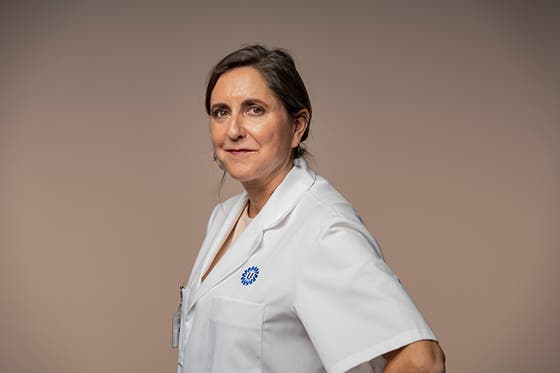Margreet Ausems appointed as professor of Clinical Oncogenetics at UMC Utrecht

Clinical geneticist Margreet Ausems has been appointed professor of Clinical Oncogenetics as of the 15th of July 2021. With this position, she wants to develop strategies to improve access to genetic testing for patients with cancer and their relatives.
Making genetic testing even more accessible
Margreet Ausems combines her work as a clinical geneticist with research focused on improving access to genetic testing in cancer, with special attention to patients with limited health literacy.
Patients with limited health literacy have difficulty with reading, understanding and applying health-related information. It has been shown that there is a disproportionate underuse of genetic testing in patients with a lower educational level or migrant background. This is because processing information given by healthcare professionals about referral to genetic counseling appears challenging. To tackle this, a training program (Erfo4all) for healthcare professionals was developed by Ausems and her team to recognize patients with limited health literacy skills and to improve communication with these patients.
The training program was developed to make healthcare professionals more aware about limited health literacy and the impact of it on communication and to train them on applying effective communication skills with patients with low health literacy skills. This training program has been well-received and proved to be useful. In a next step, this project focused on establishing a plain language guide with a list of frequently used jargon words by breast cancer healthcare professionals. These jargon words were reformulated by breast cancer counselees with limited health literacy skills and low-literate individuals.
These strategies offer opportunities to improve communication about referral to breast cancer genetic counseling. The next step is to make the training widely available and implement the training and list of reformulated jargon words in clinical practice.
Ausems: “As a professor, I want to use the coming years to apply the knowledge gained to patients with other types of cancer. To this end, we will develop methods that will make genetic testing even more accessible, also for patients from vulnerable groups. This requires collaboration with patients and patient organizations.”
Training more healthcare professionals to request DNA testing
Next to her research on awareness and training for healthcare professionals about effective communication with patients with limited health literacy, Ausems will further develop and expand training of healthcare professionals so that they can request DNA tests themselves.
Within oncology, mainly clinical geneticists request germline genetic testing; however, this implies an additional medical appointment for the patient, sometimes in another hospital. Ideally, more healthcare professionals would be able to counsel patients and request a germline DNA tests. As such, Ausems and her team developed various training modules about genetic testing for various healthcare professionals. These have already been set up in the context of ovarian cancer and breast cancer and are now being developed and stepwisely implemented in the context of prostate cancer.
Ausems: “We are now going to investigate whether this way of working is just as good for patients compared to the traditional way, where every patient has an appointment with a clinical geneticist. We will also look at what it is like for the participating healthcare providers to request DNA testing themselves."
